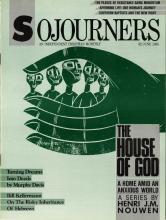His small hand gingerly reached out and tapped gently on her arm. "I know how to play soccer," he whispered—his first words to his great-great-aunt. She bent close to hear and then exclaimed, "That's wonderful!" A smile crept over her face, spreading wrinkles like ripples across a pond. He smiled too. Then he folded his hands together and pushed them into his lap and shifted on his chair and smiled at her again. She, looking beautiful and proud at 93 in her Easter dress, sat back again in her chair.
His mother, my sister, said to him, "You know, Aunt Mae used to live in Kentucky just like we do. She rode a mule." His eyes grew wide and he smiled again. I looked at her hands—now crooked with age—and imagined how strong they must have been when they guided a mule through the Appalachians, carrying the young missionary schoolteacher back in the mountain hollows long before a president officially declared a war on poverty.
She said, remembering, "It's hard to be young these days. There are so many temptations. It's so much harder now for them"—she nodded at her 6-year-old great-great-nephew—"than it was for me." She looked at him again, sighed, and folded her hands in her lap.
The small hand was tapping on her arm again. "I found a hockey puck," he said with a bit more confidence. She exclaimed, "That's wonderful!" and I knew she meant it, because it gave her such joy to see him so delighted. He told her the story of the discovery of a hockey puck.
Read the Full Article

